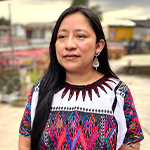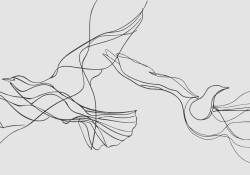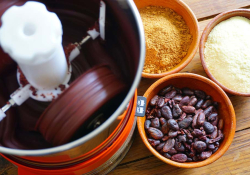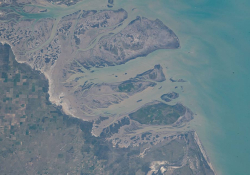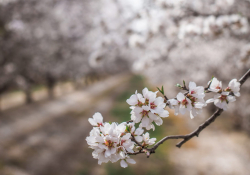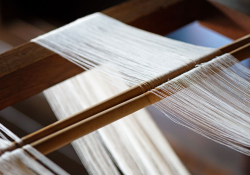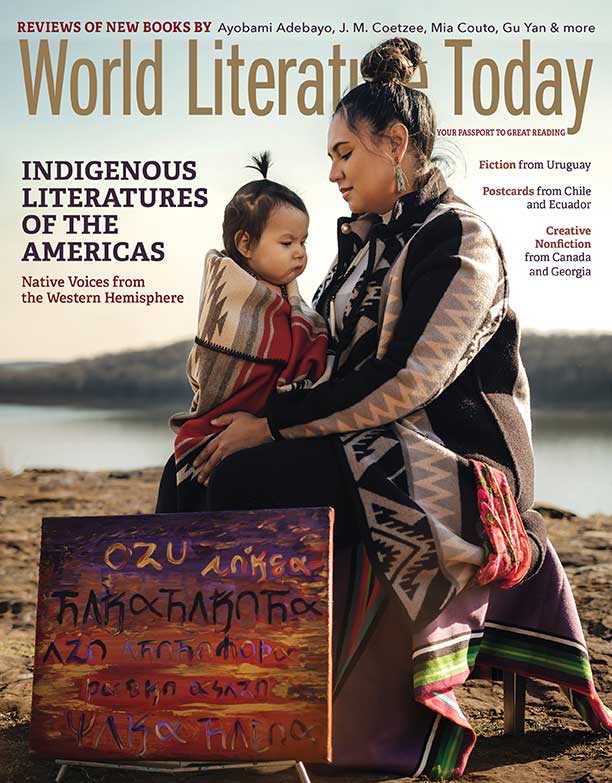Two Maya K’iche’ Poems
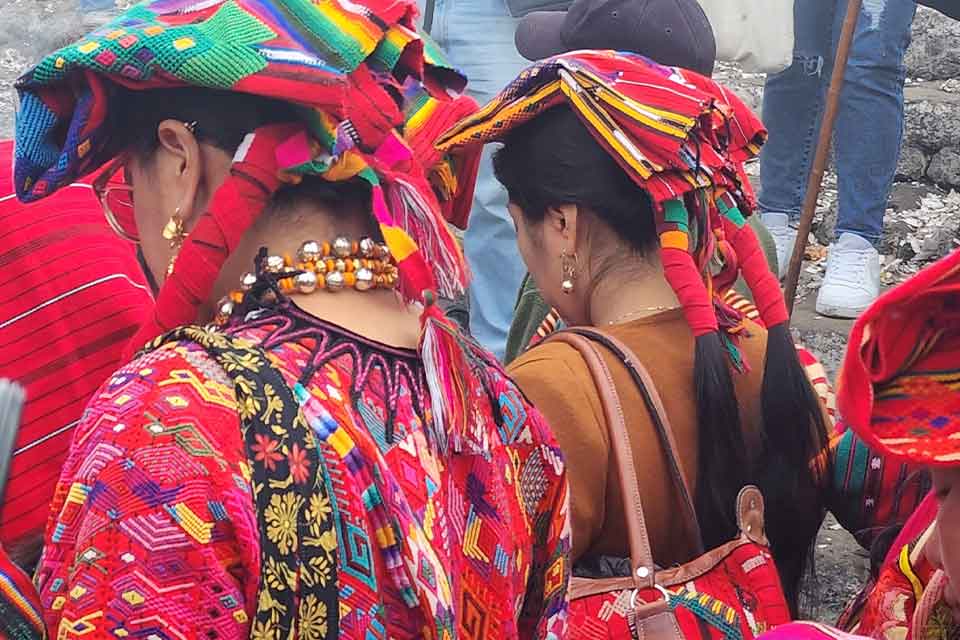
Elena Kame es un hechizo
Elena Kame es un hechizo, muerde con su boquita canina, su saliva conduce al gran río, hacia profundas cuevas y altos cerros, su amor es un encanto que ciega el camino adormeciendo las razones de la cabeza, su voz quebranta los huesos de la melancolía devolviendose en murmullo y carcajada, sus uñas saben a chile y a cacao, traga en fluido de lava, sella con cera de abeja, dedica sus lágrimas a los símbolos arcaicos de la tristeza, cuerpo de lluvia invisible dibuja tumbitas de colores y pinta sus mejillas con achiote, indescifrables estrellas de papel brillante le adornan la frente, su rostro es la máscara cáustica y burlona de la memoria, envuelve sus corazones con hoja de tusa perforando delicadamente los pezones del sonido, enhebra latidos que lucen como cuentas de collar antiguo, hace sonrojar a las espinas amando con la tenacidad de quien ha bajado descalza y desvanecida los nueve niveles del inframundo, Elena Kame se desborda como al principio de los tiempos en el gran final de los tiempos, su espíritu es hechizo y encanto a la vez.
Ri Le’n Kame are jun itzeb’al
Ri Le’n Kame are jun itzeb’al, kkayen ruk’ ri uchi’ tz’i’ uchi’, pa jun nimalaj nima’ kk’aman wi b’i ri uchub’, pa taq nima’q taq jul nima’q taq juyub’, ri oloq’onik are jun waramil ri kuchup uwach ri b’e, ke’uwartisaj ri taq no’jib’al pa ri jolomaj, ri uch’ab’al kuq’ipij ri ub’aqil ri b’isonem, kruxsaj jinijotem ki’nanem, poqon xuquje’ kakaw ruxlab’ ri taq rixk’aq, kuqumuj k’atana uwa’l juyub’, ktz’apin ruk’ unak’b’al kab’, kujach ri uwa’l uwach chi kech ri ojer taq retal ri b’isonem, q’alaj ta jab’ uch’akul, kutz’aj laj taq muqb’al, kutz’aj ri upalaj ruk’ k’oxob’, jalajoj taq kqopqota wuja ch’umil kiwiqom ri upalaj, ri upalaj are jun poqonel tze’nel chi rij ri na’tab’alil, ke’upis ri uk’u’x ruk’ jo’q kuteq’uj b’i pa utzil ri utz’um ri oq’elil, kut’is b’i taq b’uq’lajem ri je k’o ojer chachal keka’yik, ke’ukaqrisaj ri k’ix kajawan ruk’ uchuq’ab’ jun kch’anakat raqan mayal pa ri b’elejeb’ utas ri xib’alb’a, Le’n Kame ktixix lo pa ri uk’iyib’al pa ri uk’isb’alil ri q’ijsaq, itzeb’al ri uk’u’x xuquje’ k’aqab’al.
Translated into K’iche’ by Wel Raxulew
Elena Kame Is a Spell
Elena Kame is a spell, biting with her little canine mouth, her saliva leading to the great river, toward deep caves and high hills, her love will enchant you, blinding your path and numbing reason in your mind, her voice breaks the bones of melancholy, hushing to a murmur and cackle, her nails taste like chile and cacao, she gulps down flowing lava, she leaves her seal of beeswax, devoting her tears to archaic symbols of sadness, her body of invisible rain draws little colored tombs and paints her cheeks with achiote, indecipherable glitter paper stars adorn her forehead, her face is memory’s caustic, mocking mask, she wraps her hearts in corn husks, gently piercing the nipples of sound, she threads together heartbeats that shine like the beads of an ancient necklace, she makes thorns blush, loving with the tenacity of someone who has descended the nine layers of the underworld, barefoot and faint, Elena Kame overflows, as in the beginning of time, at the great end of times, her spirit will bewitch and enchant you.
* Kame is a nawal, or guardian spirit, representing death and rebirth to which the poet gives the name Elena. Chávez dedicates the poem to one of her great-grandmothers and says it calls to mind all the female ancestors who have come before, across all of time.
* * *
Qati’t q’ayes – Abuelita Planta
Chaxut’uj nuk’aslemal qati’t q’ayes,
Sóplame la vida abuelita planta
Chasipaj chuwe ri awuxlab’il
regalame tu aliento
soy animala, nubes teñidas,
estoy empezando a caminar, tambaleo, caigo
sonrío y acaricio temblando la tierra
brincos, saltos, se me caen los ojos,
no hay vergüenza, no hay miedo,
habla mi cabeza, hablan mis pies, hablan mis movimientos,
respondo a tu corazón, respondo a tu mano,
me lavo la cara en el río de la nada,
le doy de comer a los pájaros en mi boca
cae la noche y sigo bailando con mis muertos,
kok le aq’ab’ kinxojowik
despierta el sol y entibia mi tembloso corazón
ksaqarik k’are tajin kinxojow na
sóplame abuelita planta, sóplame
Chaxut’uj nuk’aslemal qati’t q’ayes
Qati’t q’ayes – Abuelita Planta
Chaxut’uj nuk’aslemal qati’t q’ayes,
Breathe life into me abuelita planta
Chasipaj chuwe ri awuxlab’il
give me your breath
I’m a beastwoman, stained clouds,
starting to walk, I stumble and fall
my smile and caresses shaking the earth
I jump, leap, my eyes fall out,
no more shame, no more fear,
my head speaks, my feet speak, every movement speaks,
I answer to your heart, to your hand,
I wash my face in the river of oblivion,
I feed birds straight from my mouth,
night falls and I keep dancing with my dead,
kok le aq’ab’ kinxojowik
the sun rises and warms my trembling heart
ksaqarik k’are tajin kinxojow na
Breathe, abuelita planta, breathe life into me
Chaxut’uj nuk’aslemal qati’t q’ayes
* In Spanish, Abuelita planta literally translates to “grandmother plant.”
Translations from the Spanish
Translator’s Note
by Gabriela Ramirez-Chavez
Rosa Chávez (b. 1980, San Andrés Itzapa, Chimaltenango, Guatemala) is of mixed Maya background—the daughter of a K’iche’ father and a Kaqchikel mother. As she grew up during the Guatemalan state’s genocide of Maya communities, her family opted to only teach her Spanish to protect her from discrimination and racism. In her late teens, she began her journey of “reconstituting my identity as a Maya woman” and reclaiming her paternal tongue, K’iche’, a Maya language with a documented 1.6 million speakers, through writing.
The poem “Elena Kame Is a Spell” comes from Ri uk’u’x ri ab’aj / El corazón de la piedra (Heart of the stone, 2010), her only collection in an entirely dual-language format—her poems are accompanied by translations into K’iche’ by Wel Raxulew. In the second poem, “Qati’t q’ayes,” written at the onset of the Covid-19 pandemic, she incorporates K’iche’ words and phrases to describe the medicinal, healing power of plants. She has been in the process of learning the language and currently collaborates with Maya translators Vianna Gonzáles and María Guarchaj to bring her work into K’iche’.
I leave all K’iche’ words untranslated in my English versions in keeping with her efforts for language reclamation and revitalization. For Chávez, poetry and translation allow others to see that “we are living cultures, organic, we are in constant transformation and not some object to be observed. . . that we are creators.”
